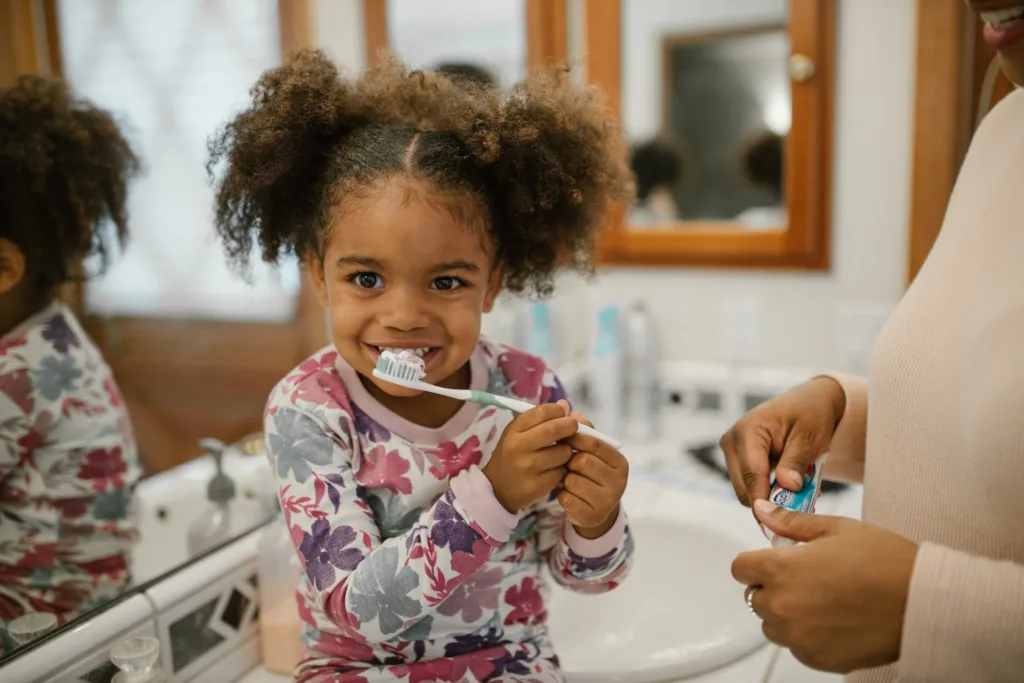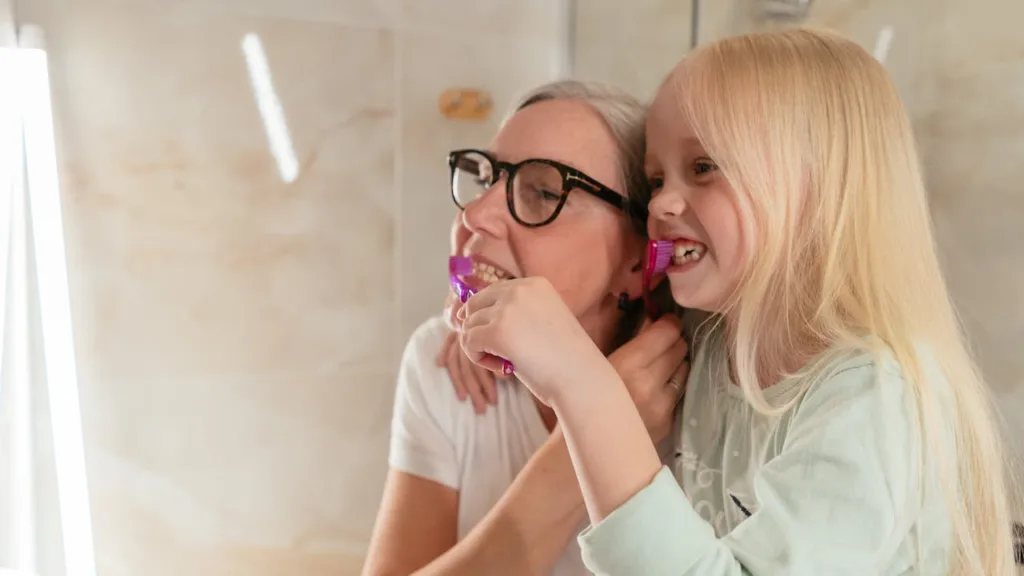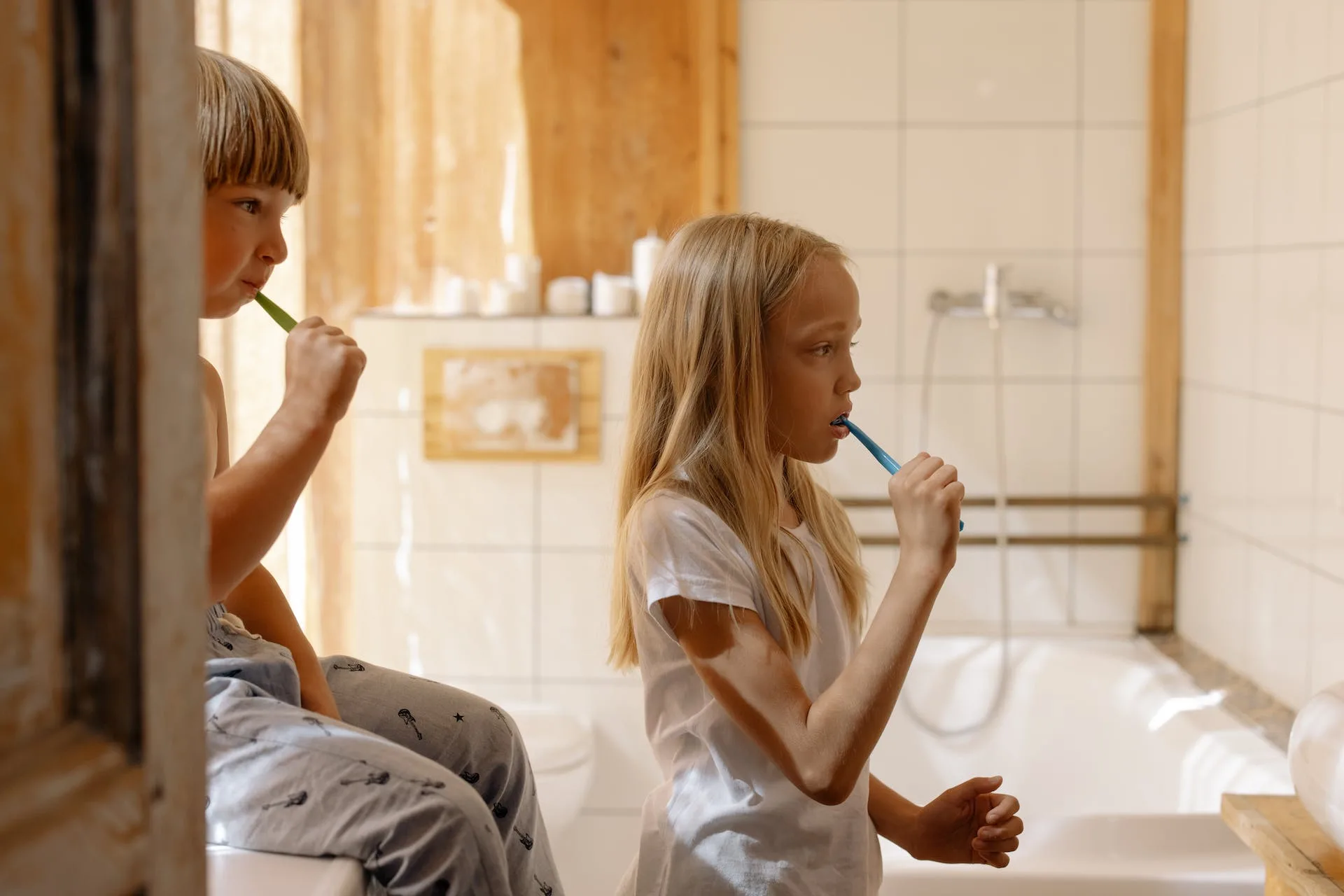Maintaining good dental hygiene is crucial for children’s overall health and well-being. As parents, we understand the importance of teaching our kids how to brush their teeth properly. But, getting our little ones to develop a consistent tooth-brushing routine can often be a challenging task. From resistance to lack of interest, there are numerous hurdles that parents face in establishing this crucial habit.
We’ll delve into the critical nature of kids brushing teeth and explore the long-term health effects of poor oral hygiene. We will also discuss the common challenges parents encounter when it comes to establishing a routine, such as when kids can start brushing on their own and begin to resist it. By understanding these challenges, we can find effective solutions to ensure our children embrace this non-negotiable habit.
Getting kids to brush their teeth doesn’t have to be a daunting task! We will also provide strategies to turn dental routine into a fun activity for kids. Discover engaging brushing games, creative approaches, and the psychology behind developing new habits. With the right techniques, we can make brushing teeth an enjoyable and effective routine for our kids.
We also have an exciting opportunity for parents. We are offering a masterclass titled ‘How to Talk so Kids Will Listen: 3 Proven Methods.’ In this masterclass, you will learn effective strategies on how to get kids to brush teeth. Don’t miss out on this valuable opportunity to enhance your child’s dental hygiene. Together, let’s ensure our kids have a healthy and beautiful smile for a lifetime.

Credit: Pexels
The Critical Nature of Brushing Teeth for Kids
The importance of a regular dental routine can never be underestimated, especially when it comes to our children’s health. Just as physical exercise is to the body, so is oral hygiene to teeth and gum health. It’s a habit that should never be compromised.
Exploring the long-term health effects of poor oral hygiene
Poor oral hygiene in children can lead to a variety of health problems that extend beyond the mouth. Tooth decay and gum disease may be the most visible issues, but the problems don’t stop there. Studies have shown a correlation between poor dental health and chronic diseases like diabetes and heart disease.
The bacteria from tooth decay can enter the bloodstream, leading to inflammation and hardening of the arteries. This condition, known as atherosclerosis, can increase the risk of heart disease. Similarly, chronic inflammation from gum diseases can make it harder to control blood sugar levels, complicating diabetes management.
In addition, poor oral hygiene can also lead to speech and eating difficulties, as well as lowered self-esteem caused by unsightly teeth or bad breath. Therefore, the implications of not brushing regularly and correctly can be far-reaching, affecting a child’s physical, developmental, and emotional health.
👉 Is your child not listening? Uncover 16 possible causes in this insightful read. Navigate parenting with clarity and strengthen your connection!
Why brushing teeth is a non-negotiable habit for kids
Given the potential health risks of not maintaining good oral hygiene, brushing teeth has to be seen as a non-negotiable habit for kids. It’s not just about having a beautiful smile, but it’s also about safeguarding their overall health and wellness.
To effectively inculcate this habit, children need to understand the importance of brushing their teeth. Explaining the potential effects of poor dental hygiene in a child-friendly language can make a significant difference. Allow children to play an active role in their oral hygiene by picking out their toothbrush and toothpaste. Make brushing their teeth an integral part of their daily routines, just like eating meals or getting dressed.
Remember, the goal is not just to get kids to brush their teeth, but to enable them to appreciate the importance of good oral hygiene, and thus willingly adopt the habit as part of their daily routine.
When it comes to positive reinforcement, consider rewarding your kids with praise or small tokens like stickers or extra playtime when they consistently adhere to their tooth-brushing routine. This will not only motivate them to keep up the good work but also make the process of brushing their teeth more enjoyable.
Understanding the Challenges of Kids Brushing Teeth
Imprinting the habit of brushing teeth in our children can be a difficult task, but it is essential for their dental health. Understanding the common struggles that parents face and the reasons why kids resist brushing their teeth can help us address these challenges appropriately and effectively.

Credit: Pexels
Common Struggles Parents Face
Often, the first hurdle is convincing your child of the importance of brushing their teeth. Children do not typically understand the concept of long-term consequences, so the risks associated with poor oral hygiene can seem abstract and unimportant to them. Also, children’s short attention spans can make it tough to keep them engaged in the task for the recommended two minutes.
Children must also be taught the importance of good oral hygiene without sparking fear or anxiety. A balanced approach to discussing oral health can foster a sense of responsibility in kids. It’s important to explain the purpose of brushing their teeth in simple terms, such as getting rid of food that’s stuck in their teeth that could cause cavities. Additionally, it can be helpful to incorporate educational children’s books or videos about dental hygiene to reinforce these concepts.
When Can Kids Brush Their Own Teeth?
Another common question among parents is when should kids start brushing their teeth. The American Dental Association recommends that parents should brush their kids’ teeth until they can do it correctly, typically around the age of six. However, the exact age can vary, and it’s crucial to consider your child’s motor skills and understanding of the importance of brushing in making this decision.
While your child is developing their ability to brush their teeth on their own, consider introducing a buddy system where you brush alongside them. It’s a great opportunity to model the correct way to brush teeth, and it can also make the process more enjoyable for them. You can also use this time to gently correct any improper techniques, ensuring they grow up knowing the most effective methods for maintaining oral hygiene. Additionally, it might be helpful to gradually increase their responsibility over time, starting with letting them apply the toothpaste or holding the brush, and then slowly stepping back as their skills improve.
Why Kids Resist Brushing Teeth
Resistance can come in many forms, from outright refusal to negligence or rushing through the process. It can be due to various reasons, such as the taste of the toothpaste, the feel of the bristles, or simply not wanting to stop their current activity for brushing.
Being mindful about the type of toothbrush and toothpaste you choose for your child can help mitigate these issues. Opt for softer bristles and fun, kid-friendly toothpaste flavors like bubblegum or fruit. Moreover, kids often mimic adult behavior, so leading by example and showing them that you also brush your teeth regularly can help.
In addition to understanding the specific reasons behind resistance, it’s crucial to maintain a positive outlook. Children’s habits and preferences can change over time, and what seems like a struggle now may not be an issue in the future.
Potential Consequences of Not Addressing this Issue
Ignoring these challenges or assuming that children will outgrow their resistance can have serious implications. Poor oral hygiene can lead to tooth decay, gum disease, and other health-related issues, as mentioned earlier. Additionally, the habits formed in childhood often carry into adulthood, so a lack of emphasis on dental hygiene can lead to long-term negative consequences.
Addressing these issues in a patient, understanding, and playful manner can turn the challenging task of getting your kids brushing teeth into a fun and engaging activity. Employing strategies like letting them choose their toothbrush or using a fun brushing song can make a world of difference in your child’s attitude towards brushing their teeth.
Turning Dental Routine into a Fun Activity: How to Get Kids to Brush Teeth
Making teeth brushing a fun and engaging activity can remove a substantial amount of stress from your daily routine. This creative approach not only helps your little ones to maintain their oral health but also promotes a positive attitude towards dental hygiene leading to lifelong good habits.

Credit: Pexels
1. Strategies to Make Brushing Teeth Fun
One of the ways you can make tooth brushing more enjoyable for kids is by turning it into a fun game. For instance, you can invent a story where they’re the superheroes, and their task is to fight the ‘bad germs’ in their mouth. Enhance the experience of kids brushing teeth by incorporating entertaining brushing apps into their routine.
You might consider having a rewards system where after a week of consistent brushing, they get to choose a family activity. You can also create a “toothbrush dance” that they have to perform while brushing. They can design their own dance moves that encourage movement and laughter.
Another idea is to use themed toothbrushes that align with their interests, which can be changed every few months. Furthermore, consider allowing them to brush their teeth with their favorite stuffed animal by their side. Lastly, creating a storybook that illustrates the adventures of tooth brushing can make them look forward to this routine.
2. Engaging Brushing Games
Games can be a great motivator for kids. You could use a timer and challenge them to keep brushing until the time runs out. Alternatively, you could make up a song about brushing teeth and dance while you brush. You could also turn it into a family competition to see who can make the most bubbles with their toothpaste.
3. The Role of Creativity and Innovation in Transforming Dental Routine
Transform kids brushing teeth into a delightful activity with your creativity and innovation. Child-friendly toothbrushes with their favorite cartoon characters or brushes that play music can make brushing time exciting. You can also let your children choose their toothpaste flavor, as this might make them more willing to brush.
4. Understanding Child Psychology in Relation to Developing New Habits
It’s also crucial to understand child psychology to make tooth brushing effective. Children respond well to positive reinforcement. So, praise them when they do a good job brushing their teeth. Create a reward system, such as a sticker chart, where they earn a sticker each time they brush their teeth.
Remember, making tooth brushing fun can be different for each child. Some kids may love a dance party in the bathroom, while others might enjoy a quiet story. The important thing is to find what works for your child and to be consistent with it.
The key is to make toothbrushing an enjoyable experience rather than a chore. Start by creating a relaxed and fun atmosphere during brushing time, build up a routine, and eventually, your child will get used to it and even look forward to brushing their teeth.
Essential Habits Begin in Childhood
Kids brushing their teeth is an essential habit that contributes to their overall health and well-being. It’s more than just about maintaining a beautiful smile but also about safeguarding their overall health. We have identified the challenges parents often face and offered creative strategies to make brushing a fun and exciting activity. We’ve seen how games, creativity, and letting them take part in their oral hygiene can effectively change their attitude towards brushing teeth.
👉 Tackling a strong-willed child? Discover effective strategies in this article on ‘How to Get a Strong-Willed Child to Listen.‘ Strengthen communication and build a stronger connection!
Now more than ever is the time to ensure that our children understand and appreciate the importance of maintaining good oral hygiene. It may seem like an impossible task, but by taking a step back and turning this routine into an enjoyable activity, we can set the foundation for our kids’ lifelong oral health.
To help you on this journey, we are offering a masterclass. This masterclass will provide you with effective strategies to establish kids brushing teeth routine and overcome the challenges you may be facing. So, why wait? Secure a brighter, healthier future for your children by taking the first step today. We at parents.app are committed to helping you ensure your kids develop the best dental hygiene habits for a lifetime of beautiful, healthy smiles. Let’s create a fun and effective dental routine for your kids together!
👉Still wondering how to get kids to brush teeth? Meet Sophie, your intelligent parenting ally! Elevate your parenting journey with expert advice. Try Sophie today and navigate parenthood with confidence!
References
American Psychological Association & National Association for the Education of Young Children. (2001). Violence Prevention for Families of Young Children [Brochure], American Psychological Association
Ashby, F. G., Turner, B. O., & Horvitz, J. C. (2010). Cortical and basal ganglia contributions to habit learning and automaticity. Trends in cognitive sciences, 14(5), 208–215. https://doi.org/10.1016/j.tics.2010.02.001
Centers for Disease Control and Prevention. (2019). Active listening. https://www.cdc.gov/parents/essentials/communication/activelistening.html
Weinstein, N., Vansteenkiste, M., & Paulmann, S. (2019). Listen to your mother: Motivating tones of voice predict adolescents’ reactions to mothers. Developmental psychology, 55(12), 2534–2546. https://doi.org/10.1037/dev0000827










